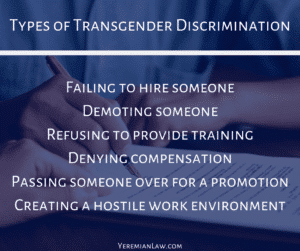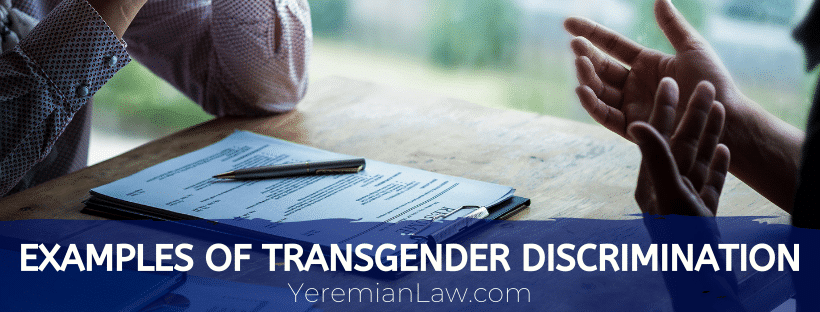Transgender discrimination is illegal – and if you feel you’ve been a victim of it, you could have legal options.
What is Transgender Discrimination?
Transgender discrimination is a serious issue in the U.S., with as many as 78 percent of all transgender people reporting that they’ve experienced at least one type of harassment or mistreatment at work. It can involve things like an employer’s failure to hire someone, demoting someone, or even firing someone because they’re transgender. Generally, it falls under LGBTQ+ discrimination.
Fast Facts on Transgender Discrimination
Some types of transgender discrimination are:
- Failing to hire someone
- Demoting someone
- Passing someone over for a promotion
- Refusing to provide training
- Denying compensation
- Forcing someone to work in a hostile work environment
Transgender Rights in the Workplace: A California Requirement
California employers must post a “Transgender Rights in the Workplace” poster in the workplace, with all other mandatory workplace notices in a prominent and accessible location. (You can see the poster here.)
Laws That Make Transgender Discrimination Illegal
The Fair Employment and Housing Act, or FEHA, makes transgender discrimination illegal. Under FEHA, employers can’t discriminate against a person because of:
- Sex
- Gender
- Gender identity
- Gender expression
These laws are in place to protect all workers and require employers to provide opportunities based on workers’ abilities – not their gender.
Transgender Rights in the Workplace
Within the workplace and in job interviews, transgender people have protected rights. Some transgender rights include:
- The right to be free from interview questions designed to detect their gender identity
- The right to be free from interview questions about marital status, spouse’s name or how household members are related to each other
- The right to be free from interview questions about their bodies or whether they plan to have surgery
- The right to dress according to their gender identity and gender expression, unless the employer can demonstrate a necessity that requires otherwise
- The right to safe and appropriate restroom and locker room facilities that correspond to their gender identity
Can An Employer Legally Discriminate Against Transgender People?
 It is illegal for an employer to discriminate against transgender people, but there are some exceptions that can easily be confused for discrimination. When the employer can show a bona fide occupational qualification, or BFOQ, it can treat some employees differently. However, there are very few genuine BFOQ defenses. In order for an employer to say that it has a bona fide occupational qualification, it must show that “all or substantially all of the excluded individuals are unable to safely and efficiently perform the job in question and because the essence of the business operation would otherwise be undermined.” (You can read the full text in section the California Code of Regulations, Section 7286.7.)
It is illegal for an employer to discriminate against transgender people, but there are some exceptions that can easily be confused for discrimination. When the employer can show a bona fide occupational qualification, or BFOQ, it can treat some employees differently. However, there are very few genuine BFOQ defenses. In order for an employer to say that it has a bona fide occupational qualification, it must show that “all or substantially all of the excluded individuals are unable to safely and efficiently perform the job in question and because the essence of the business operation would otherwise be undermined.” (You can read the full text in section the California Code of Regulations, Section 7286.7.)
Employers cannot use a BFOQ defense to justify a client preferring to work with employees of one sex or gender, the need to provide separate facilities or because traditionally, members of one sex have always performed a certain type of job.

Examples of Transgender Discrimination
Transgender discrimination takes many forms in the workplace. Some of the most common forms of transgender discrimination include:
- Firing someone because they’re planning to transition
- Firing someone because they transitioned
- Harassing someone based on a transition (or an intent to transition)
- Denying someone equal access to a common bathroom that corresponds to their gender identity
- Failing to hire someone because they’re transgender
- Forcing someone to quit because they’re transgender
- Paying someone less because they’re transgender
Do You Need to Talk to a Lawyer About Transgender Discrimination?
If you’ve been a victim of transgender discrimination, you may need to talk to a Glendale employment lawyer who can help.
Call us at 818-230-8380 right now for a free consultation. You’ll talk to a caring, compassionate and experienced employment lawyer who understands what you’re going through – and who knows how to help.




